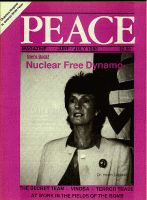
Peace Magazine Jun-Jul 1988, page 8. Some rights reserved.
Search for other articles by Ron Dart here
Ten years have elapsed since construction began at the U.S. Navy's submarine base in Bangor, Washington. This $750 million complex is home to eight Trident submarines. Thirty of these vessels of mass destruction are planned. The Trident is armed with twenty-four missiles, each carrying ten hydrogen bombs. That makes 240 warheads - enough to destroy every major city in the Northern Hemisphere.
Everything at the base appears to be running smoothly. Area residents realize that their paycheques ultimately depend on the Trident and its related weapons systems. Rows of bunkers containing thermonuclear warheads and missile propellant are strategically camouflaged by carefully tended forests within the huge complex. In the words of James Douglas, a founding member of Ground Zero, the Trident's political and military function is to become the centrepiece in a policy threatening a world-annihilating first strike.
As twilight stretches its silent fingers along the Pacific coast, an intentional community of courageous men and women, strikingly different from the majority living around the base, stands silent, monitoring and - when the moment is right -resisting further development of the military base. Like a team of modern Davids, they face a mighty Goliath - the land, personnel, and finances of this heavily guarded establishment.
In 1975 the group, calling itself the Pacific Life Community, decided to opt for a life of nonviolence, informing the American public about the Pentagon's "first strike" policy, and saying "No" to the Trident. Most members live in the State of Washington and in British Columbia. A handful of them decided to move into the Bangor area, with the intention of dialoging with workers at the base and building friendships with people in the surrounding area. Two years later, "Bangor Summer" was initiated. Some land was borrowed for three months, and throughout the season seminars on nonviolence were conducted. Participants lived communally, and made daily trips to the base, to leaflet workers and protest the coming of the Trident. By that fall, seven people purchased land in the neighborhood and Ground Zero came into being. Over the past decade, Ground Zero has sponsored several demonstrations. Some of those who took part were fined, others jailed. On April 24, 1987, fifteen members of the community were tried and found guilty of illegal acts, such as entering the naval base, or sitting on railroad tracks.
GROUND ZERO ALSO BEGAN THE "NUCLEAR Train Campaign" around 1982. The final assembly
point for all nuclear warheads manufactured in the U.S. is the Pantex facility in Amarillo, Texas. Many of these were transported to Bangor by Burlington Northern Railroad. The campaign was designed to track these "White Trains," alert citizens as to what they were carrying, and post vigils by the tracks as the trains moved through each town.
There is a network of people, living at various points on the
A dedicated group of activists near Bangor, Washington, has stood witness to the nuclear weapons built in their country for ten years now. It's the Trident they're watching now.
route between Amarillo and Bangor, who notify the media and one another when the trains pass through. The government has had some of these people arrested, re-routed the trains to avoid publicity, and even made it illegal for people to disclose the particulars of their movements.
In May 1978, while the U.N. was holding its First Special Session on Disarmament, 4,000 demonstrators showed up at Bangor: 300 were arrested for climbing the fence around the Naval base and planting a huge U.N. flag on the hill. Over the next four years, four key employees left their jobs to join the Trident campaign When the authorities at Bangor were preparing to welcome the first Trident in August 1982, Ground Zero organized a flotilla of two flagships, two launches, a canoe, and sixteen rowboats to "block" the submarine's entry. The Navy responded by bringing in nineteen ships to keep the intruders out! The Coast Guard used water hoses and threatened to use machine guns, rifles and pistols.
Karol Schulkin of Ground Zero was asked to assess the success of the blockade. In her response she recalled the experience of a 78-year old peace activist who found herself facing a member of the Coast Guard, who was aiming a hose at her. She looked up at him and said, "Young man, not in my America, please! " The man just laid down the hose and walked away. There was the Federal Marshal, who spent several hours in the company of prisoners being escorted from the Bangor base to the Seattle Courthouse. At the end of the trip, he turned to a woman and asked her for her peace button, which he pinned on his uniform as he left her. Another Coast Guard man apologized to Ground Zero for the harsh treatment they received. Some members of the crew of USS Ohio admitted in confidence that the Trident was a dangerous weapon and needed to be stopped. Myra Barr, a member of Ground Zero, admits that it is a real challenge for them to Sustain their hopes against tremendous odds. Members of the Ground Zero community come from a variety of backgrounds and they realize that contemplation must walk hand in hand with resisting anything that negates life.
Ron Dart is a disarmament activist in Washington State.

Peace Magazine Jun-Jul 1988, page 8. Some rights reserved.
Search for other articles by Ron Dart here